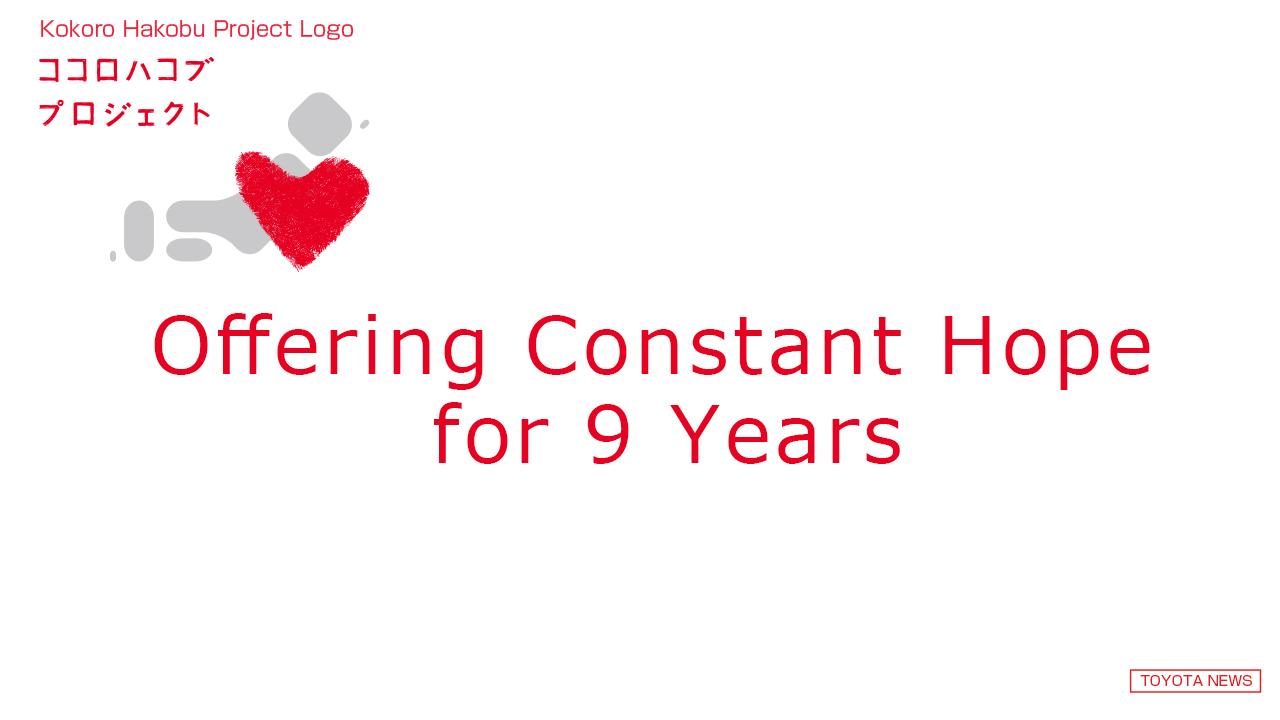
The Toyota Group is conducting support activities for those who fight against COVID-19 under the same banner as it did following the Great East Japan Earthquake - the "Kokoro Hakobu Project". What does it hope to accomplish with this project?

You might wonder what that car’s payload is. Is it people? Luggage? Fuel and supplies? Ultimately Toyota Motor Corporation President Akio Toyoda says that regardless of actual contents, the cars are carrying "Heart (Kokoro)." This was the strong feeling that he had as he made his way up to the disaster stricken area of Tohoku following the Great East Japan Earthquake that struck on March 11, 2011.
To revisit that fateful moment in Akio’s past, on March 26, 2011 he was in a car traveling to Miyagi Prefecture, the prefecture immediately adjacent to the ocean-based epicenter of the trembler, where a Toyota plant was located. It was the first day that the expressway was opened once again to the public. His goal was to visit the disaster-hit areas to encourage the Toyota team members. These colleagues had already been working hard to save lives, and they were now in need of help torecover and restore the local area, production, and to support them to reach conclusions more swiftly, make prompt decisions, and take immediate action.
Traveling to the site, Akio had his own set of rules or guidelines to follow.
"Bring his own food" - He, like other travelers, should bring his own food so as to not consume what belongs to the local residents.
"Leave no trash" - He hoped his travel would not add to the burden already being carried by the local residents by cleaning up after himself.
"Do not take unnecessary staff to the venue" - By limiting the number of people with him, he hoped there would be less fuss and logistics to worry about so he could remain focused on the situation in Tohoku.
On his journey, he came across cars with license plates from many different prefectures. Each car was packed full of supplies, all heading to Tohoku, specifically Miyagi Prefecture, the center of operations following the disaster.
Akio reflects on those days as follows:
[The cars] were carrying supplies, but I also had the intense realization that they were delivering their “hearts,” or emotional relief, to worried families and people of the Tohoku Region.
I have never felt as strongly as I did then that a car is also a vehicle for conveying emotions. I want to keep that experience with me for the rest of my life.
Quoted from: What we can do now for the future – An urgent online interview with President Akio Toyoda
Thanks to the availability of mobility, people’s thoughts can reach even far away areas affected by disasters, helping to energize the local people. Nine years have passed since then, and the scene is still etched in Akio's heart.
In response, within just two months after his visit to Tohoku, Toyota launched the "Kokoro Hakobu Project," a project intended to offer further support for the affected areas. Now, this same name has been given to Toyota’s group activities aimed at helping people recover from COVID-19. That heart can be felt in Akio's comments at the April 10th joint press conference of the four industry associations involved in automobile manufacturing in Japan.
Currently, just like on cold winter days, people still cannot go outside.
In that context, it is likely that many people are now rediscovering the “joy of moving.”
Being able to go outside and go where you want is truly wonderful. This situation has made all of us, including myself, feel and realize that again.
The word “move” means "to move physically," but it also can mean “moving your heart to change” and "being moved (emotionally)."
In my opinion, I am convinced that these two meanings can be said to be in the same word.
In the midst of another crisis, the value of "moving" and the role that the automobile industry should play are being reconsidered. In summary, the thoughts and approach that both Akio and Toyota are taking toward this new crisis are ultimately the same as they were nine years ago.
<Related link>

